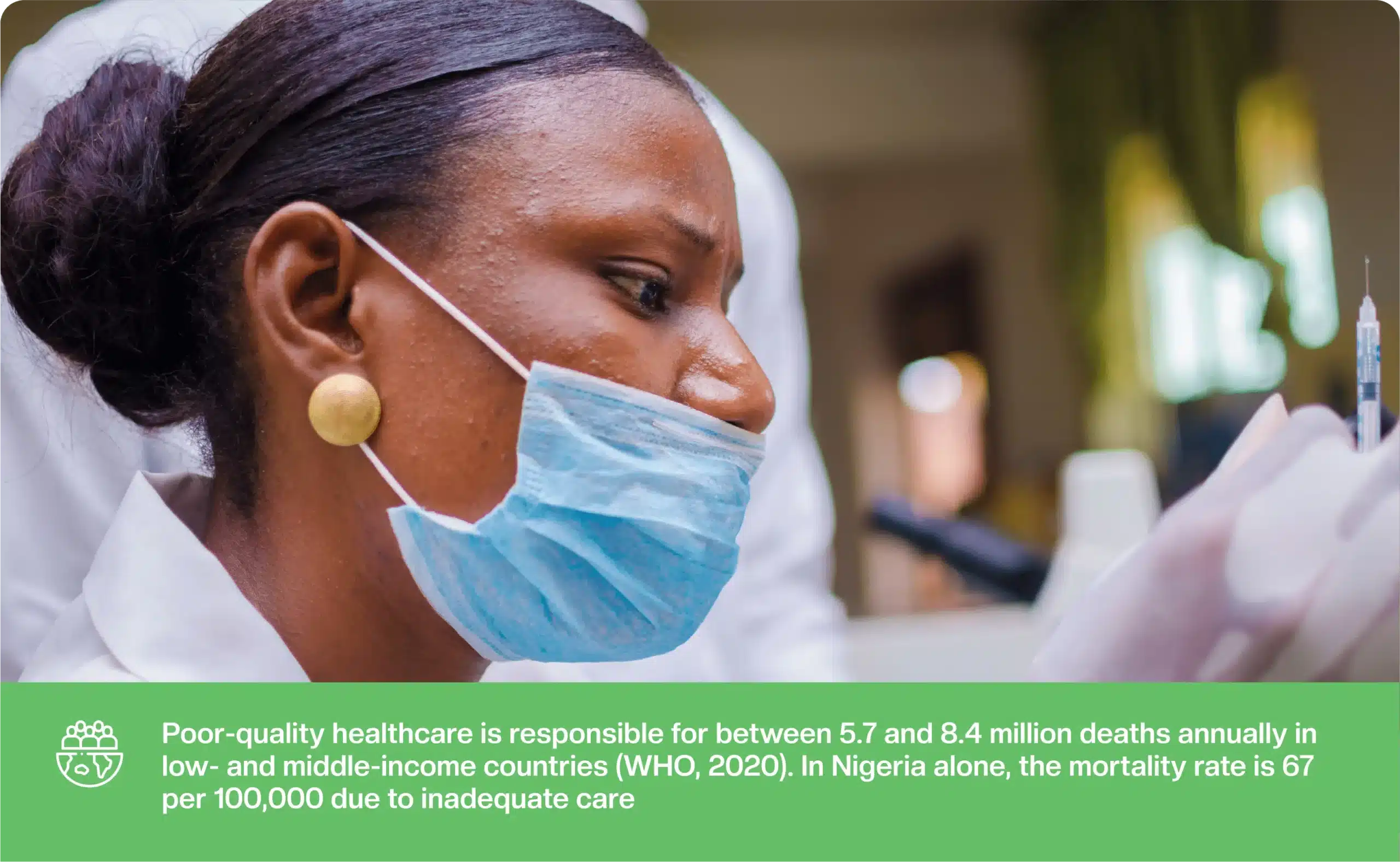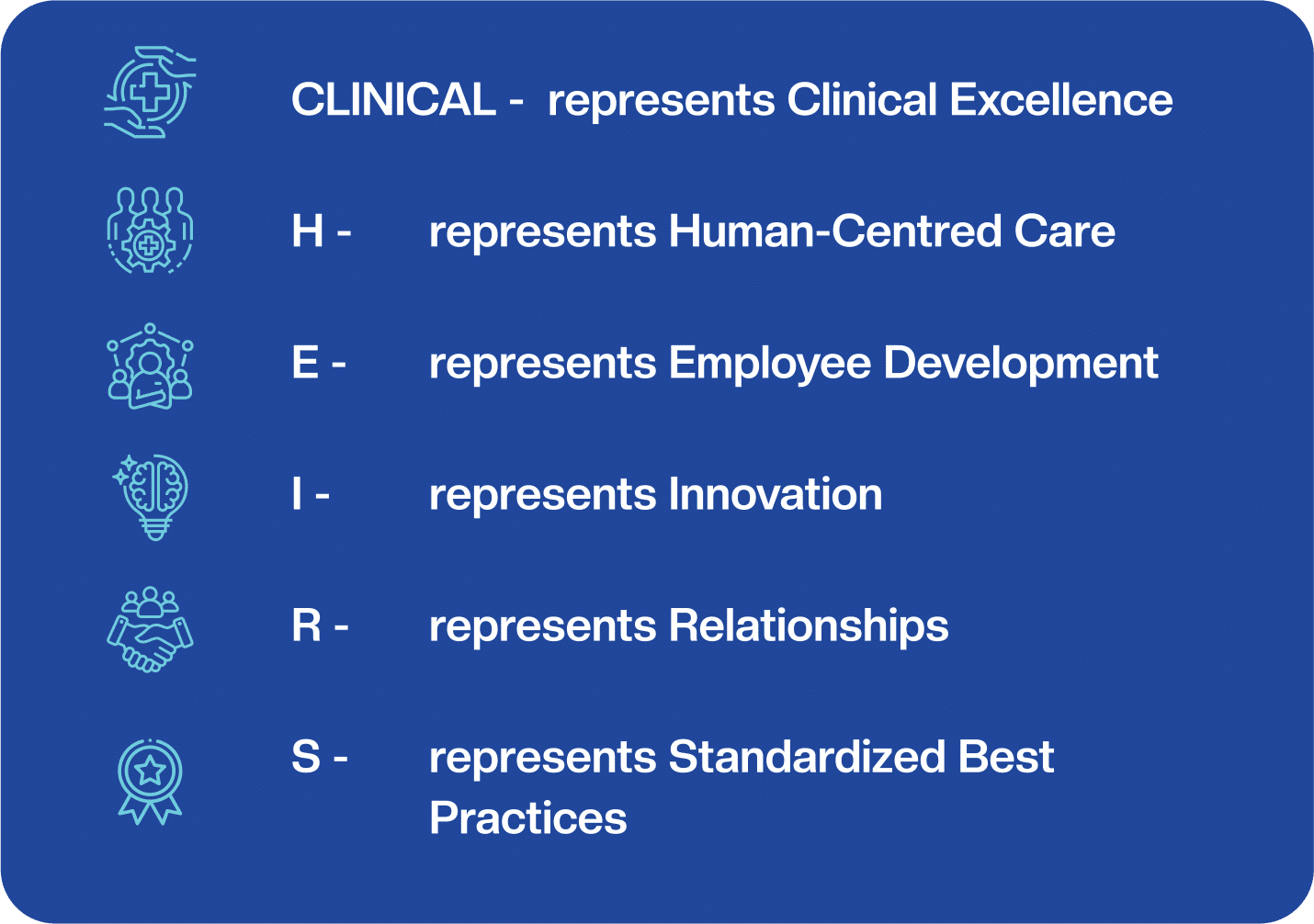
Redefining Healthcare in Nigeria
Nigeria’s healthcare system is at a critical juncture, with millions of lives at stake and an urgent need for revolutionary healthcare management.
The statistics are alarming: Poor-quality healthcare is responsible for between 5.7 and 8.4 million deaths annually in low- and middle-income countries (WHO, 2020). In Nigeria alone, the mortality rate is 67 per 100,000 due to inadequate care (Lancet Global Health Commission Report, 2018). These figures represent lives lost and devastated families.
AGCare has launched the 10 Million Lives Project in response to this crisis, an ambitious initiative to transform the quality of care accessible to 10 million Nigerians in 10 years. At the heart of this transformative project is the AGCare CLINICAL-HEIRS strategic healthcare management framework, designed to ensure that quality, patient-centric care becomes a reality for every Nigerian. This framework was painstakingly created based on AGCare’s extensive experience managing various healthcare institutions in Nigeria, including public and private sector healthcare institutions, making it globally relevant and adaptable for local and international applications. It is our blueprint for effective healthcare management.
The Healthcare Crisis We Cannot Ignore
The Nigerian healthcare system faces numerous challenges that severely compromise the quality of care. These challenges fall into five critical areas: inconsistent clinical outcomes, poor patient experience, limited accessibility and affordability, inadequate healthcare personnel, and insufficient infrastructure and resources. These areas contribute to an often ineffective, unsafe, and inequitable healthcare environment.
Clinical outcomes are a crucial indicator of the effectiveness of healthcare services. Unfortunately, these outcomes are inconsistent in many Nigerian healthcare facilities and frequently fall short of global standards. This inconsistency can be attributed to a lack of standardized protocols and insufficient clinical governance. The need for robust clinical governance structures and standardized clinical protocols is evident.
The patient experience in many Nigerian hospitals leaves much to be desired. Long wait times, a lack of empathy from healthcare providers, and poor communication are common issues. These factors contribute to a negative perception of the healthcare system and deter individuals from seeking necessary care. A focus on improving patient experience is essential to restoring trust in the healthcare system.
Accessibility and affordability remain significant barriers to healthcare in Nigeria. Geographic challenges, high costs, and inadequate healthcare infrastructure prevent many Nigerians from receiving timely and effective care. To address these barriers, strategic partnerships and collaborations are needed to extend the reach and affordability of healthcare services.
Another major challenge is the lack of adequately trained healthcare personnel. A substantial number of healthcare workers lack the training and resources to provide high-quality care, leading to suboptimal patient outcomes. Investing in the continuous learning and development of healthcare personnel is critical to ensuring a skilled and competent workforce.
Inadequate infrastructure and resources further exacerbate the challenges the Nigerian healthcare system faces. Many facilities are outdated and lack the necessary equipment to provide comprehensive care. Upgrading infrastructure and ensuring the availability of essential resources are vital to improving the quality of care.
A Data-Driven Approach to Healthcare Management
To tackle these challenges, AGCare has developed the CLINICAL-HEIRS framework. The CLINICAL-HEIRS framework is a comprehensive, six-step model designed to address these challenges and drive improvements across all aspects of healthcare delivery.

Clinical Excellence
Achieving consistency and excellence in clinical outcomes through robust governance structures and standardized clinical protocols is crucial. This approach ensures that patients receive the best possible care regardless of where they are treated. By implementing these structures and protocols, healthcare institutions can track and measure success through metrics such as the presence and effectiveness of governance frameworks and the implementation and adherence to standardized clinical protocols.
Human-Centered Care
Healthcare services should be designed and delivered around the patient’s needs. At AGCare, our human-inspired patient experience blueprint leverages data and technology to offer personalized and empathetic care. This approach significantly enhances patient satisfaction and promotes better health outcomes. Success in Human-Centered Care can be measured through patient feedback, satisfaction scores, and the quantity and quality of personalized care provided using patient data and technology.
Employee Development
Focusing on healthcare personnel’s continuous learning and development ensures they possess the skills and knowledge required to deliver high-quality care. AGCare provides numerous opportunities for professional growth locally and internationally, investing in our healthcare workforce’s human capital. Success in this area can be measured by the availability and quality of training programs and the competency levels of healthcare personnel.
Innovation
The CLINICAL-HEIRS framework’s innovation component is a core component in driving continuous improvement in healthcare delivery.
By integrating cutting-edge technologies and methodologies, innovation can enhance patient care and operational efficiency. Success in innovation can be measured through the adoption rate of new technologies and methodologies and their tangible impact on patient outcomes and operational processes.
Relationships
Leveraging strategic relationships is essential to making healthcare accessible and affordable. By collaborating with local and international partners, we can extend our reach and resources to benefit patients and the community. These relationships also enable us to share best practices and improve the overall quality of care. Success in this area can be measured by the number and quality of partnerships and the tangible benefits these collaborations bring to patient care and accessibility.
Standardized Best Practices
Ensuring all healthcare facilities adhere to the highest quality standards is essential. Establishing and maintaining rigorous safety protocols creates safe environments for both patients and healthcare workers. A commitment to standardized best practices promotes consistency and excellence in care delivery. Metrics for success include the consistent implementation of safety protocols and uniformity in care delivery across all facilities.
